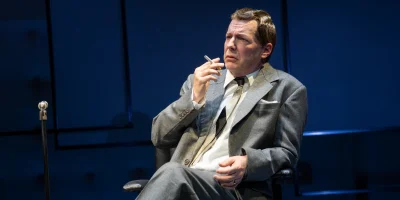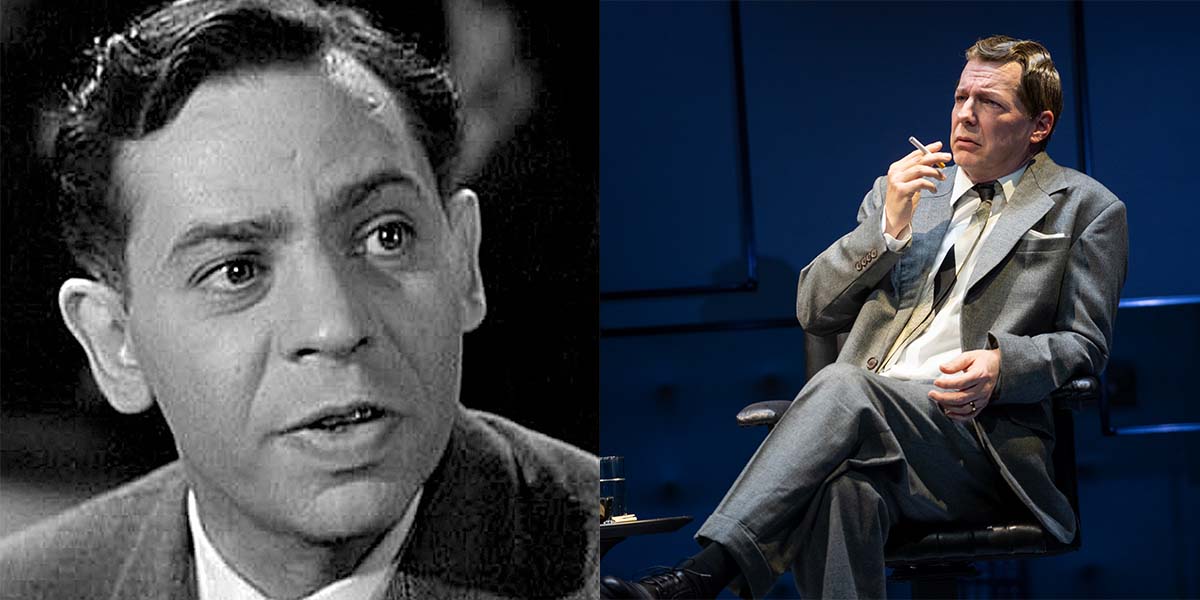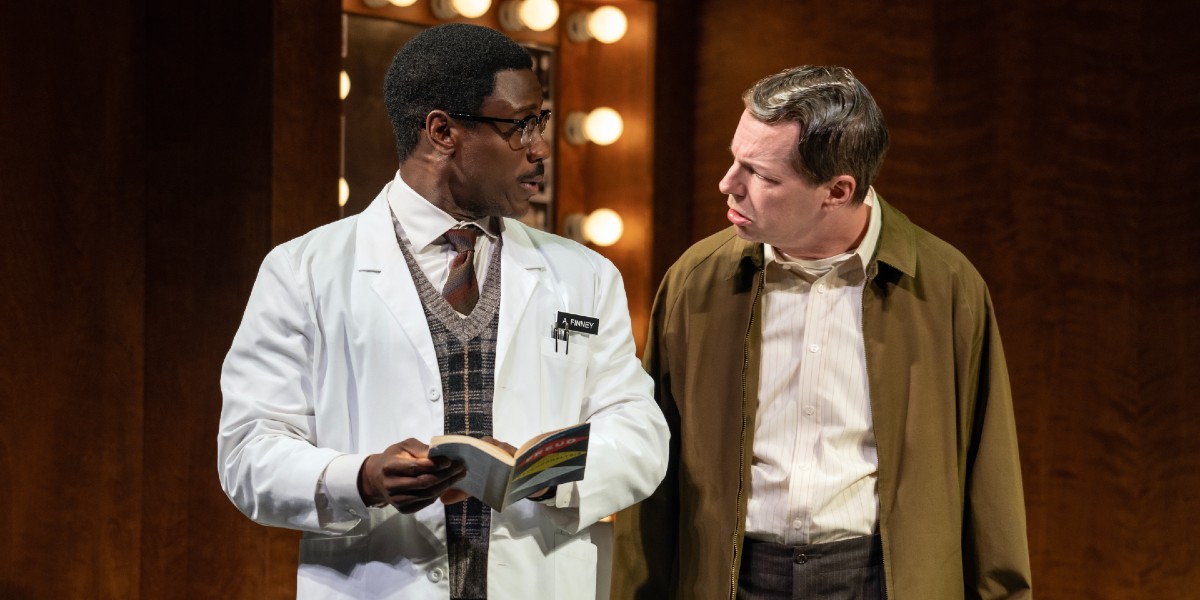
Learn about Oscar Levant before seeing 'Good Night, Oscar' on Broadway
Doug Wright's new Broadway play focuses on the day the pianist and composer went down in history for his wit, candidly discussing his mental health on live TV.
In an era before oversharing on social media was de rigeuer, Oscar Levant — “America's first publicly dysfunctional celebrity” — was unusually forthright about his mental health.
The life of the musician/performer/talk show host is explored on stage in Good Night, Oscar, in a new play by Pulitzer Prize-winning author Doug Wright (I Am My Own Wife). Beloved Will and Grace star Sean Hayes returns to Broadway as the title character, and New York Theatre Guide called his performance “a powerful and cohesive character study.” But who was the real Oscar Levant?
In short, Levant was a pianist known for his performances of George Gershwin’s works, and he was also a composer, conductor, and actor. Good Night, Oscar honors his singular musical talent, but the play focuses on the night he became more famous for something else: his no-holds-barred wit, which he revealed by candidly making all manner of taboo jokes on Tonight Starring Jack Paar during a four-hour release from a psychiatric institution.
Many of Levant’s quotes have gone down in history, but his name remains largely unknown. Learn more about the historical figure who inspired Wright’s play, and then head to the Belasco Theatre to experience the depths of Levant’s brilliance and tragedy.
Who is Oscar Levant?
Oscar Levant was born in Pittsburgh in 1906 to Jewish immigrant parents from Eastern Europe. Like many immigrant families, Levant’s parents wanted their children to become successful professionals — a career as a musician and performer was not exactly what the Levants had in mind.
Nevertheless, Levant demonstrated considerable talent as a piano player at an early age. When his father passed away, 15-year-old Levant moved to New York to study with Zygmunt Stojowski, the head of the piano department at the institution that later became The Julliard School.
A few years later, he headed to Hollywood, where he composed film scores and wrote pop songs for the radio and music program Hit Parade. As a composer, Levant’s most famous piece is the 1934 jazz standard “Blame It on My Youth.” Music legends, including Frank Sinatra, Nat King Cole, Rosemary Clooney, Bing Crosby, and Sammy Davis Jr., and contemporary Broadway stars Melissa Errico and Katharine McPhee, have all recorded the song.

He briefly returned to New York to conduct on Broadway but continued to work on and in films. As a performer, Levant often portrayed musicians, like pianist Adam Cook in An American in Paris and Fred Astaire’s musical sidekick Lester Martin in The Bandwagon. (He also inspired the title pianist in The World of Henry Orient.)
PBS described Levant in his prime as “the highest paid — and easily the most temperamental — classical musician in the United States.” In Good Night, Oscar, Paar urges Levant to perform and appease audience expectations — and, showing his temperamental side, he refuses at first. He finally (begrudgingly) agrees to make up for upsetting the censors with his on-air remarks.
Levant’s friendship with George Gershwin
Levant was good friends with George Gershwin, the composer of Porgy & Bess, Of Thee I Sing, Funny Face, An American in Paris, Strike Up the Band, and many more seminal films and stage musicals.
Levant seemed to both envy and admire the successful songwriter, with whom he had much in common. Like Levant, Gershwin was an American-born child of Eastern European Jewish immigrants, and he initially studied classical piano but found himself drawn to jazz and popular music. Levant was reportedly devastated when Gershwin died suddenly in 1937 from a brain tumor. In Good Night, Oscar, Gershwin’s ghost appears to Levant as hallucinations, representing Levant’s guilt for outliving his friend.
As time passed, Levant became the foremost interpreter of George Gershwin’s music. He was even the first pianist to record Gershwin’s “Rhapsody in Blue” besides the composer.
“Rhapsody in Blue” is featured in the climax of Good Night, Oscar; it’s the song Hayes (as Levant) performs for Paar’s live broadcast. And yes, Hayes plays the piano live each night. Before he became an actor, Hayes wanted to be a concert pianist and grew up studying classical piano.

Levant’s appearances on Tonight Starring Jack Paar
Celebrated by contemporaries for his encyclopedic mind and sharp sense of humor, Levant appeared on numerous TV programs, ranging from quiz shows to late-night programs. He even had his own syndicated offering, The Oscar Levant Show, for several years in the 1950s.
Levant frequently appeared on Tonight Starring Jack Paar (now The Tonight Show) between 1958 and 1962. The live broadcast depicted onstage in Good Night, Oscar is an amalgam of multiple broadcasts, featuring famous Levant quips from several different appearances. Some of his best-known ones include:
- Paar: “And what do you do for exercise?” Levant: “I stumble, and then I fall into a coma.”
- “When you're suffering from deep depression, you cannot make a decision. I first had deep apathy, then relapsed into deep depression. Gee, how I long for those deep apathy days.”
- “My behavior has been impeccable. I’ve been unconscious for the past six months.”
Not only did Levant openly discuss his mental health issues on live television, but he made jokes about his condition. During the 1950s, TV was heavily censored, and people did not talk about struggling with addiction, depression, or suicide. Paar (played by Ben Rappaport) recognized that Levant’s unpredictability and openness would boost ratings, but not everybody was thrilled. As illustrated in the play, network president Bob Sarnoff (Peter Grosz) worries whether Levant will even arrive and if he’ll say something incendiary on live television.
On the flip side, people also worried about whether having Levant on the show was good for his mental health. New York Times TV critic Jack Gould wondered “whether the good moments were quite worth the accompanying tasteless excursion into humor at the expense of the mentally and emotionally disturbed” and accused Paar of “deriv[ing] some laughs from the pianist’s dilemma.”
Paar certainly didn’t shy away from Levant’s mental health concerns. He once introduced his guest by explaining, “He's as nervous as he is clever — for every pearl that comes out of his mouth, a pill goes in.”

Levant’s mental health
Levant struggled with mental health issues exacerbated by a heart attack in the early 1950s. He subsequently became addicted to the painkiller Demerol. While most people back then would not necessarily have had the understanding or language to diagnose Levant, some 21st-century publications have noted his “textbook OCD symptoms,” and others have suggested he was likely bipolar.
As depicted in the play, Levant’s wife June (a Broadway and film actress in her own right, played by Emily Bergl) institutionalized him several times as his condition worsened, but he was sometimes temporarily released from the hospital to perform. Levant was extraordinarily open about his situation: “I’m playing under the auspices of Mount Sinai!” he announced to his audience at the Hollywood Bowl in 1958 (the same year the play takes place).
He passed away in 1972 at age 65. Though the ethics were contentious, Levant’s TV appearances and frank discussions of his struggles undoubtedly paved the way for people to discuss mental health openly.
“Anything can happen on live TV,” Good Night, Oscar purports, and so it is with live theatre. On Broadway, what’s happening in this play is a tribute to a flawed but talented man who composed a new way of marrying humor and honesty.
Photo credit: Good Night, Oscar on Broadway. (Photos by Joan Marcus)
Originally published on
